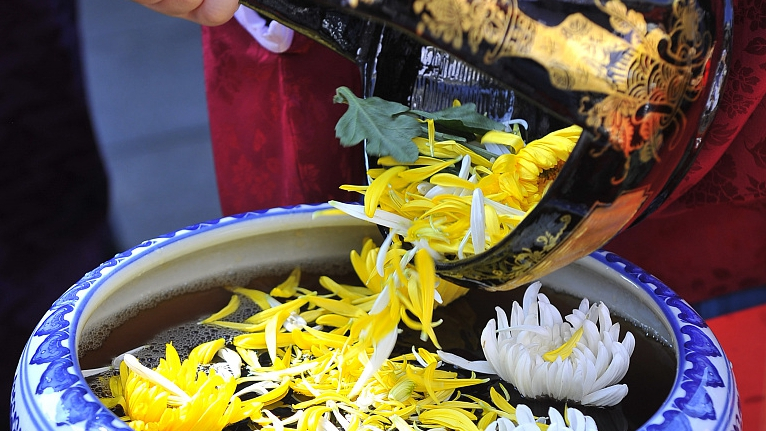The Double Ninth Festival, or Chong Yang Festival, observed on the ninth day of the ninth month in the Chinese calendar, is a traditional Chinese holiday. It was mentioned in writing since before the Eastern Han period (25-220 A.D.) and was established as a formal folk festival in the Tang Dynasty (618-907).
Although the Double Ninth Festival is fixed on the ninth day of the ninth month in the lunar calendar, its date in the Gregorian calendar varies, and October 7 marks this year's festival.
The festival coincides with the changing of the leaves and the blooming of chrysanthemums, so Chinese also call the lunar month "the month of chrysanthemum." Similarly, the Double Ninth Festival is also known as the chrysanthemum festival.
By its name, chrysanthemums play a role in many of the rituals including viewing the pretty flower and drinking chrysanthemum wine.

People put chrysanthemum and pour the yellow wine into a pot to make chrysanthemum wine during the Double Ninth Festival held in Fuzhou City, Fujian Province, October 28, 2017. /VCG Photo
People put chrysanthemum and pour the yellow wine into a pot to make chrysanthemum wine during the Double Ninth Festival held in Fuzhou City, Fujian Province, October 28, 2017. /VCG Photo
Chrysanthemum wine is made from chrysanthemum and glutinous rice wine. There are also some places to make chrysanthemum wine with yellow wine, such as Fuzhou, capital city of Fujian Province. It was also regarded as "lucky wine" in ancient times for its health effects.
Tao Yuanming, a Chinese poet who lived during the Eastern Jin (317-420) and Southern (420-479) dynasties, also said that "wine can dispel all kinds of diseases, and eating chrysanthemum can prevent aging."
In the Ming and Qing dynasties (1368-1911), various herbs were added to chrysanthemum wine. Li Shizhen, a Chinese acupuncturist, herbalist and naturalist, recorded in the "Compendium of Materia Medica" that chrysanthemums have the effect of "treating the headache, and improving visual and auditory acuity."
Along with wine, hairy crabs are one of the most sought-after seasonal delicacies during this time.
Steamed crab is the most simple and traditional of eating hairy crabs. Westerners might choose to pair their hairy crab with champagne or white wine, but if you are going to try the local food, you also can keep the old-school way – pairing with Chinese wine, such as yellow wine.
Of course, the custom of the Double Ninth Festival is more than eating and drinking. It also includes many folk customs and cultural connotations, including visiting the scenery, climbing the mountain, and going to view chrysanthemums.
On May 20, 2006, the Double Ninth Festival was included in the first batch of China Intangible Cultural Heritage List by the State Council. With the cultural inheritance and development, mountain climbing and focuses on care for the elderly have been two important themes of recent Double Ninth Festival activities.
The Law of the People's Republic of China (PRC) on Protection of the Rights and Interests of the Elderly, which came into effect on July 1, 2013, clearly stipulates that the ninth day of the ninth lunar month is the national festival for the elderly.
(Cover image made by Li Wenyi)